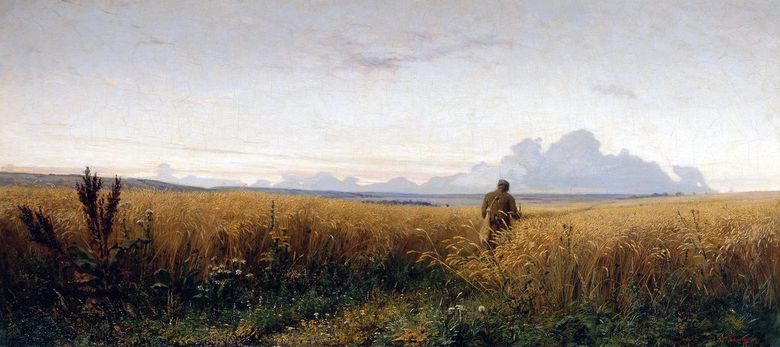
As a boy, Grigory Myasoyedov saw and remembered all the events, traditions and customs from the life of a small village in the Tula province, where he spent his childhood. Everything in the observant Grigorii caused a lively genuine interest: how simple peasants sow bread, care for cattle, how joyful events are marked and what rituals they perform. Having become an artist and having become acquainted with the traditions of European countries, Myasoedov remained faithful to his only love – Russian nature and the Russian people, with its rich past and present.
“The Road to the Rye” is a canvas-memory, a vivid picture from childhood memories, which started a new life on canvas. Field. Infinite, wide, rich field. With tenderness and immense love, the artist has written out every poured spikelet, every blade of grass and leaf. Weedy meadow flowers peek out among the tight ears, but they do not spoil the general impression of the Russian field that splashed majestically on the ground, boundless as the sea.
It stretched from edge to edge of the canvas, going far beyond the horizon. The extraordinary vividness of the letter gives the impression that one has only to listen, and one can immediately hear how the wind is walking slowly among the stalks of rye. The only thing that interrupts the flat surface of the field is a narrow country road that runs right to the center.
A traveler is walking along a road covered with flowers in worn-out clothes, with a bag on his shoulder and a staff in his hands. The viewer will not see his face. It must be a beggar, a pilgrim, or just a traveler. He walked a long way during his travels – a stooped, tired figure and a bowed head betray him. But there in front, where he goes, you can see the roofs of village houses and the gray evening sky with clouds carrying rain. Does he put on a bed and rest there?
Constant movement, the feeling of incomplete paths and quiet peaceful grief comes from the canvas. But there is no fear, no offense, no despair. Only humility and unheard wind in the field.
 Kostsy (Strange time) by Grigory Myasoedov
Kostsy (Strange time) by Grigory Myasoedov Swallowing by Grigory Myasoedov
Swallowing by Grigory Myasoedov La route du seigle – Grigory Myasoedov
La route du seigle – Grigory Myasoedov Portrait of V. M. Garshin by Grigory Myasoedov
Portrait of V. M. Garshin by Grigory Myasoedov Zemstvo Lunches by Grigory Myasoedov
Zemstvo Lunches by Grigory Myasoedov Autumn morning by Grigory Myasoedov
Autumn morning by Grigory Myasoedov The burning of Avvakum by Grigory Myasoedov
The burning of Avvakum by Grigory Myasoedov Grandfather of the Russian fleet by Grigory Myasoedov
Grandfather of the Russian fleet by Grigory Myasoedov